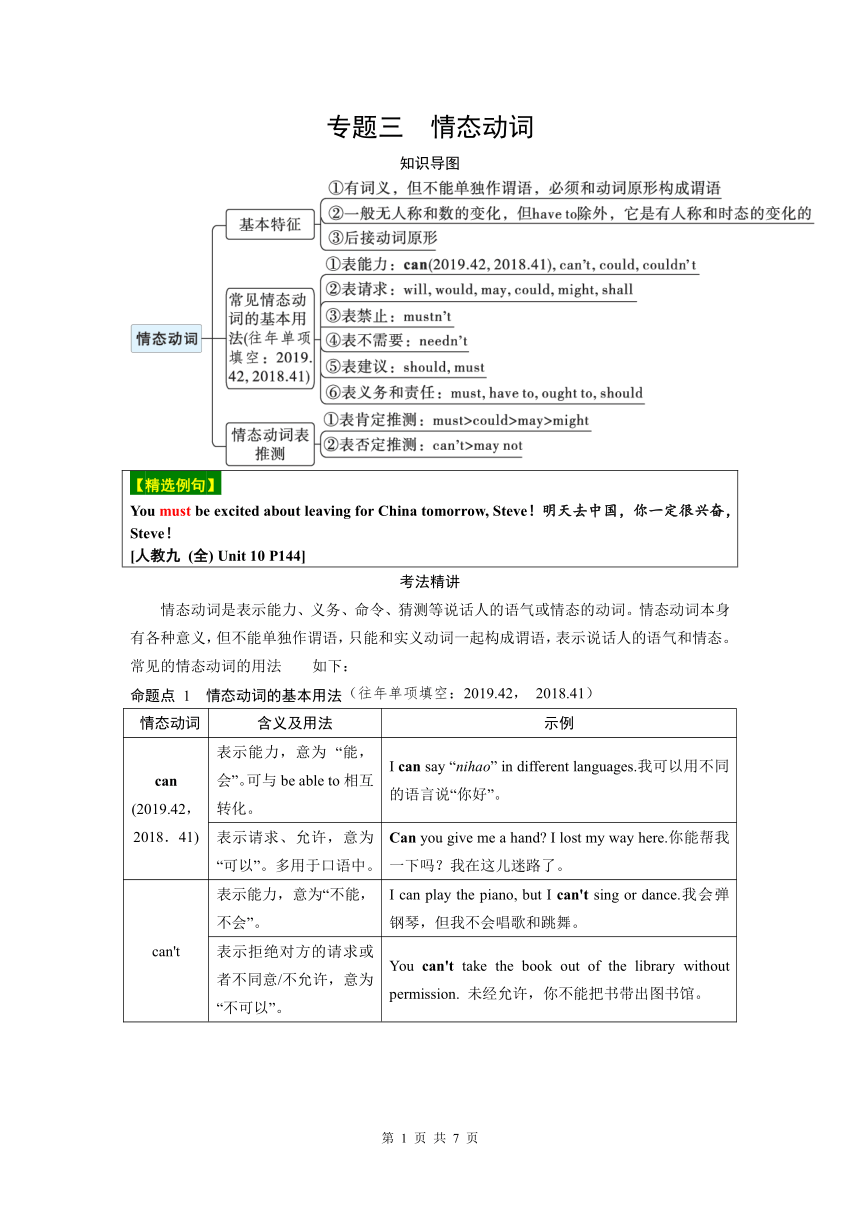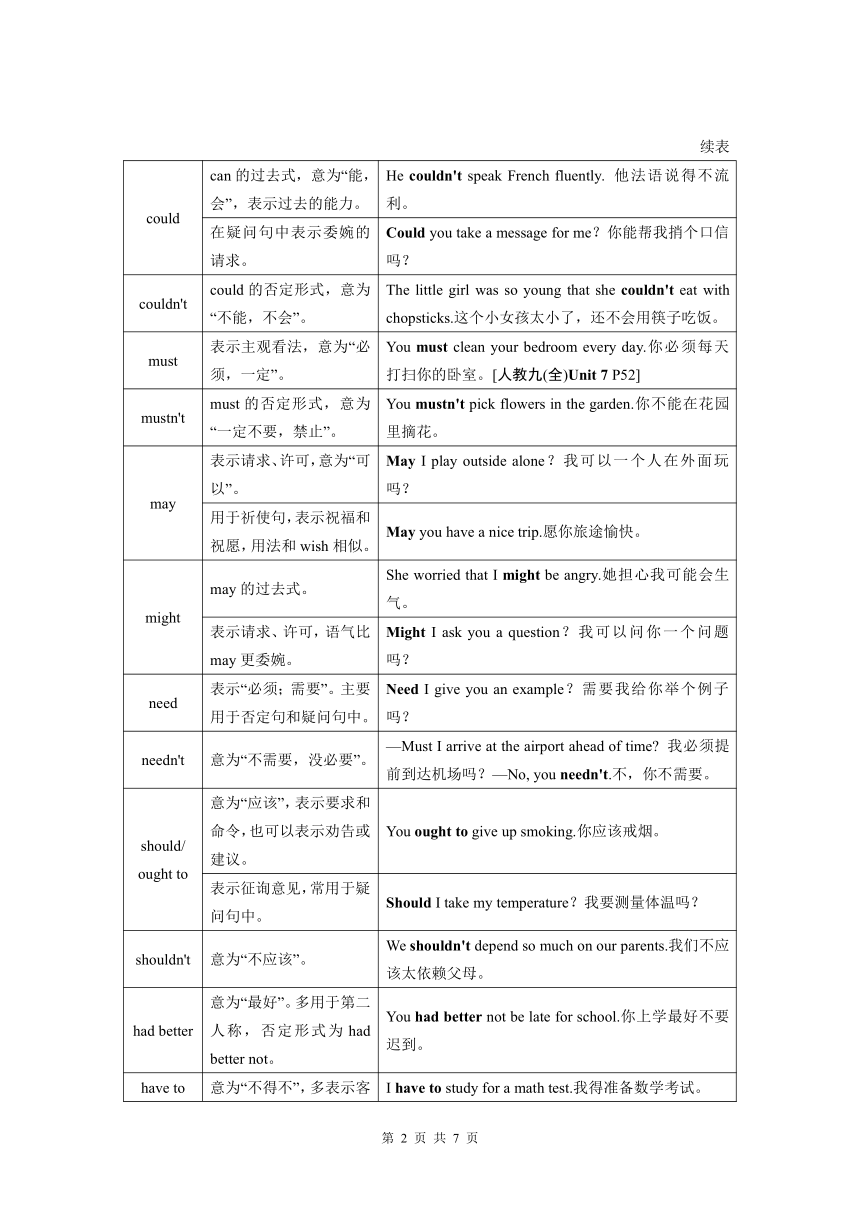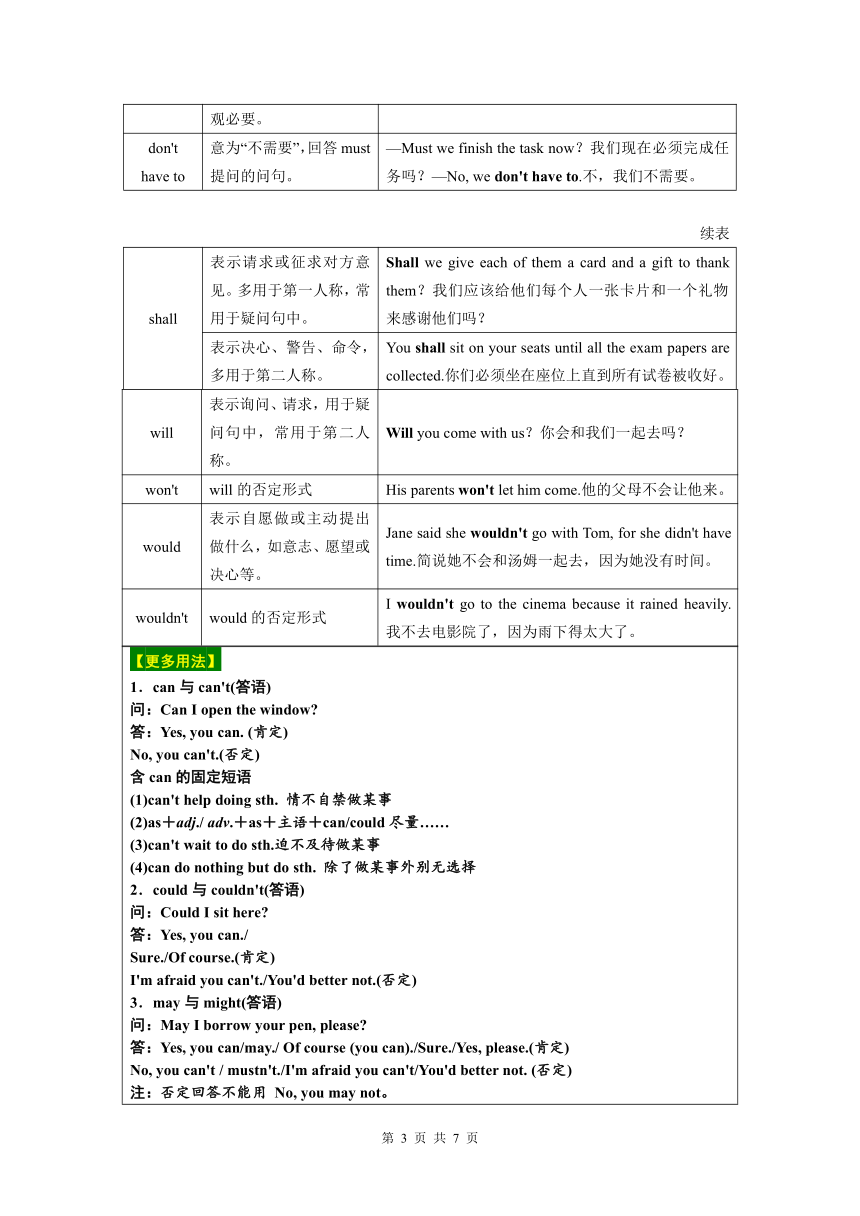2024年中考 英语总复习 语法专题突破 情态动词(含答案)
文档属性
| 名称 | 2024年中考 英语总复习 语法专题突破 情态动词(含答案) |  | |
| 格式 | doc | ||
| 文件大小 | 201.5KB | ||
| 资源类型 | 教案 | ||
| 版本资源 | 通用版 | ||
| 科目 | 英语 | ||
| 更新时间 | 2024-02-02 11:48:37 | ||
图片预览



文档简介
专题三 情态动词
知识导图
【精选例句】You must be excited about leaving for China tomorrow, Steve!明天去中国,你一定很兴奋,Steve![人教九 (全) Unit 10 P144]
考法精讲
情态动词是表示能力、义务、命令、猜测等说话人的语气或情态的动词。情态动词本身有各种意义,但不能单独作谓语,只能和实义动词一起构成谓语,表示说话人的语气和情态。常见的情态动词的用法 如下:
命题点 1 情态动词的基本用法
情态动词 含义及用法 示例
can(2019.42,2018.41) 表示能力,意为 “能,会”。可与be able to相互转化。 I can say “nihao” in different languages.我可以用不同的语言说“你好”。
表示请求、允许,意为 “可以”。多用于口语中。 Can you give me a hand I lost my way here.你能帮我一下吗?我在这儿迷路了。
can't 表示能力,意为“不能,不会”。 I can play the piano, but I can't sing or dance.我会弹钢琴,但我不会唱歌和跳舞。
表示拒绝对方的请求或者不同意/不允许,意为“不可以”。 You can't take the book out of the library without permission. 未经允许,你不能把书带出图书馆。
续表
could can的过去式,意为“能,会”,表示过去的能力。 He couldn't speak French fluently. 他法语说得不流利。
在疑问句中表示委婉的请求。 Could you take a message for me?你能帮我捎个口信吗?
couldn't could的否定形式,意为“不能,不会”。 The little girl was so young that she couldn't eat with chopsticks.这个小女孩太小了,还不会用筷子吃饭。
must 表示主观看法,意为“必须,一定”。 You must clean your bedroom every day.你必须每天打扫你的卧室。[人教九(全)Unit 7 P52]
mustn't must的否定形式,意为“一定不要,禁止”。 You mustn't pick flowers in the garden.你不能在花园里摘花。
may 表示请求、许可,意为“可以”。 May I play outside alone?我可以一个人在外面玩吗?
用于祈使句,表示祝福和祝愿,用法和wish相似。 May you have a nice trip.愿你旅途愉快。
might may的过去式。 She worried that I might be angry.她担心我可能会生气。
表示请求、许可,语气比may更委婉。 Might I ask you a question?我可以问你一个问题吗?
need 表示“必须;需要”。主要用于否定句和疑问句中。 Need I give you an example?需要我给你举个例子吗?
needn't 意为“不需要,没必要”。 —Must I arrive at the airport ahead of time 我必须提前到达机场吗?—No, you needn't.不,你不需要。
should/ought to 意为“应该”,表示要求和命令,也可以表示劝告或建议。 You ought to give up smoking.你应该戒烟。
表示征询意见,常用于疑问句中。 Should I take my temperature?我要测量体温吗?
shouldn't 意为“不应该”。 We shouldn't depend so much on our parents.我们不应该太依赖父母。
had better 意为“最好”。多用于第二人称,否定形式为had better not。 You had better not be late for school.你上学最好不要迟到。
have to 意为“不得不”,多表示客观必要。 I have to study for a math test.我得准备数学考试。
don't have to 意为“不需要”,回答must提问的问句。 —Must we finish the task now?我们现在必须完成任务吗?—No, we don't have to.不,我们不需要。
续表
shall 表示请求或征求对方意见。多用于第一人称,常用于疑问句中。 Shall we give each of them a card and a gift to thank them?我们应该给他们每个人一张卡片和一个礼物来感谢他们吗?
表示决心、警告、命令,多用于第二人称。 You shall sit on your seats until all the exam papers are collected.你们必须坐在座位上直到所有试卷被收好。
will 表示询问、请求,用于疑问句中,常用于第二人称。 Will you come with us?你会和我们一起去吗?
won't will的否定形式 His parents won't let him come.他的父母不会让他来。
would 表示自愿做或主动提出做什么,如意志、愿望或决心等。 Jane said she wouldn't go with Tom, for she didn't have time.简说她不会和汤姆一起去,因为她没有时间。
wouldn't would的否定形式 I wouldn't go to the cinema because it rained heavily. 我不去电影院了,因为雨下得太大了。
【更多用法】1.can与can't(答语)问:Can I open the window 答:Yes, you can. (肯定)No, you can't.(否定)含can的固定短语(1)can't help doing sth. 情不自禁做某事(2)as+adj./ adv.+as+主语+can/could尽量……(3)can't wait to do sth.迫不及待做某事(4)can do nothing but do sth. 除了做某事外别无选择2.could与couldn't(答语)问:Could I sit here 答:Yes, you can./Sure./Of course.(肯定)I'm afraid you can't./You'd better not.(否定)3.may与might(答语) 问:May I borrow your pen, please 答:Yes, you can/may./ Of course (you can)./Sure./Yes, please.(肯定)No, you can't / mustn't./I'm afraid you can't/You'd better not. (否定)注:否定回答不能用 No, you may not。4.need 与needn'tneed有作情态动词和实义动词两种用法:句式情态动词实义动词肯定句原形,无人称、时态和数的变化有人称、时态和数的变化否定句need+notdo/does/did+not+need to 疑问句...+need+(not)+主语...?...do/does/did+(not)+主语+need to...?
命题点 2 情态动词的表推测用法
情态动词 含义及用法 示例
can't 表示否定推测,语气强烈,意为“一定不,不可能”,可能性几乎为零。 Danny can't be playing on the playground. I saw him in the library just now. 丹尼不可能在操场上玩。我刚才在图书馆看见他了。[冀教九(全)Unit 4 P62]
could 表推测,意为“有可能,也许”,语气缓和,较委婉。 It could be a girl's room because it's very tidy.这可能是一个女孩的房间,因为它很整洁。
must 表示非常有把握的肯定推测,100%的可能性,意为“一定,肯定”。 They must be very tired after a long walk.走了这么长的路,他们一定很累了。
may 意为“有可能,也许”,用于肯定句,表示把握不大的推测。 The plane may be put off because of the terrible weather.飞机可能因恶劣的天气而误点。
may not 表示否定推测,语气不确定,意为“可能不”。 It may not be Mary's schoolbag. She doesn't like black. 它可能不是玛丽的书包。她不喜欢黑色。
might 表推测,意为“有可能,也许”,可能性低于may,语气缓和,较委婉。 She might have gone to the library. She likes reading. 她可能去图书馆了。她喜欢读书。
【拓展】
1. 情态动词的疑问用法及回答
(1)May I ...?表示请求时,否定回答用mustn't或can't。如:
—May I buy some candy?我可以买些糖果吗?
—No, you can't.不,你不能(买)。
(2)由must引导的一般疑问句,肯定回答用must或have to,否定回答用needn't或don't have to。如:
—Must I finish the homework today?我今天必须完成作业吗?
—No, you needn't/don't have to.不,你不需要。
(3)由could引导的一般疑问句,回答用can,不用could。如:
—Could I use your mobile phone?我可以用你的手机吗?
—Yes, you can.是的,你可以。
2. 情态动词表推测
(1)表示肯定推测的情态动词有:must>could>may>might(按语气强弱)
(2)表示否定推测的情态动词有:can't>may not(按语气强弱)
综合提升
A. 小题夯基
1. Dirty air and water are harmful. They ________ kill plants, and even people.
A. can B. can't C. should D. shouldn't
2. —Yuan Longping, a famous Chinese scientist, used to do research on sea rice.
—If farmers ________ start planting rice in salty water, China's food supply will surely rise.
A. can B. can't C. must D. mustn't
3. —Must I stay here and wait for you
—No, you ________. You can go home now.
A. needn't B. can't C. mustn't
4. I ________ look after my little sister at home this Saturday, so I can't go to the library with you.
A. may B. must C. can
5. The researchers suggest that listening to music before going to bed ________ be worse for our sleep.
A. should B. need C. may
【好词佳句积累】 used to do sth.过去常常做某事 wait for等待
B.微语篇提能
武术成就梦想
中华优秀传统文化·功夫 Kung fu is a great Chinese tradition. Chinese children have the chance to go to the specialized(专门的) schools and study kung fu every day!
Li Zheng, from Shanghai, is thirteen years old. She __1__ practice kung fu on the playing field every day with hundreds of other students. Every morning and evening, Li has to practice her kung fu moves for hours. She said she wanted to be a police officer, so she __2__ train hard.
The training is difficult and Li __3__ live at home. She can only see her family during the holidays. Li __4__ do a lot of different moves like the frog(青蛙) and the snake. She is proud of herself. She believes that her dream __5__ come true one day through hard work! Everyone __6__ stick to their dreams like her.
1. A. would B. must C. may
2. A. might B. can C. should
3. A. needn't B. mustn't C. can't
4. A. can B. may C. must
5. A. would B. might C. will
6. A. should B. must C. may
【语篇研读】What:讲述了李筝通过学习功夫实现梦想的故事。Why:旨在引导学生坚持自己的梦想,并通过自己的努力实现梦想。How:①文体特征:记叙文。②语言特点:文章使用了“every day”,“Every morning and evening”,“for hours”及“during the holidays”等时间状语,描述了李筝刻苦训练的过程。
专题三 情态动词
【综合提升】
A. 1. A 2. A 3. A 4. B 5. C
B. 【主旨大意】本文是一篇记叙文。主要讲述了李筝通过学习功夫来实现梦想的故事。
1. B 2. C 3. C 4. A 5. C 6. A
知识导图
【精选例句】You must be excited about leaving for China tomorrow, Steve!明天去中国,你一定很兴奋,Steve![人教九 (全) Unit 10 P144]
考法精讲
情态动词是表示能力、义务、命令、猜测等说话人的语气或情态的动词。情态动词本身有各种意义,但不能单独作谓语,只能和实义动词一起构成谓语,表示说话人的语气和情态。常见的情态动词的用法 如下:
命题点 1 情态动词的基本用法
情态动词 含义及用法 示例
can(2019.42,2018.41) 表示能力,意为 “能,会”。可与be able to相互转化。 I can say “nihao” in different languages.我可以用不同的语言说“你好”。
表示请求、允许,意为 “可以”。多用于口语中。 Can you give me a hand I lost my way here.你能帮我一下吗?我在这儿迷路了。
can't 表示能力,意为“不能,不会”。 I can play the piano, but I can't sing or dance.我会弹钢琴,但我不会唱歌和跳舞。
表示拒绝对方的请求或者不同意/不允许,意为“不可以”。 You can't take the book out of the library without permission. 未经允许,你不能把书带出图书馆。
续表
could can的过去式,意为“能,会”,表示过去的能力。 He couldn't speak French fluently. 他法语说得不流利。
在疑问句中表示委婉的请求。 Could you take a message for me?你能帮我捎个口信吗?
couldn't could的否定形式,意为“不能,不会”。 The little girl was so young that she couldn't eat with chopsticks.这个小女孩太小了,还不会用筷子吃饭。
must 表示主观看法,意为“必须,一定”。 You must clean your bedroom every day.你必须每天打扫你的卧室。[人教九(全)Unit 7 P52]
mustn't must的否定形式,意为“一定不要,禁止”。 You mustn't pick flowers in the garden.你不能在花园里摘花。
may 表示请求、许可,意为“可以”。 May I play outside alone?我可以一个人在外面玩吗?
用于祈使句,表示祝福和祝愿,用法和wish相似。 May you have a nice trip.愿你旅途愉快。
might may的过去式。 She worried that I might be angry.她担心我可能会生气。
表示请求、许可,语气比may更委婉。 Might I ask you a question?我可以问你一个问题吗?
need 表示“必须;需要”。主要用于否定句和疑问句中。 Need I give you an example?需要我给你举个例子吗?
needn't 意为“不需要,没必要”。 —Must I arrive at the airport ahead of time 我必须提前到达机场吗?—No, you needn't.不,你不需要。
should/ought to 意为“应该”,表示要求和命令,也可以表示劝告或建议。 You ought to give up smoking.你应该戒烟。
表示征询意见,常用于疑问句中。 Should I take my temperature?我要测量体温吗?
shouldn't 意为“不应该”。 We shouldn't depend so much on our parents.我们不应该太依赖父母。
had better 意为“最好”。多用于第二人称,否定形式为had better not。 You had better not be late for school.你上学最好不要迟到。
have to 意为“不得不”,多表示客观必要。 I have to study for a math test.我得准备数学考试。
don't have to 意为“不需要”,回答must提问的问句。 —Must we finish the task now?我们现在必须完成任务吗?—No, we don't have to.不,我们不需要。
续表
shall 表示请求或征求对方意见。多用于第一人称,常用于疑问句中。 Shall we give each of them a card and a gift to thank them?我们应该给他们每个人一张卡片和一个礼物来感谢他们吗?
表示决心、警告、命令,多用于第二人称。 You shall sit on your seats until all the exam papers are collected.你们必须坐在座位上直到所有试卷被收好。
will 表示询问、请求,用于疑问句中,常用于第二人称。 Will you come with us?你会和我们一起去吗?
won't will的否定形式 His parents won't let him come.他的父母不会让他来。
would 表示自愿做或主动提出做什么,如意志、愿望或决心等。 Jane said she wouldn't go with Tom, for she didn't have time.简说她不会和汤姆一起去,因为她没有时间。
wouldn't would的否定形式 I wouldn't go to the cinema because it rained heavily. 我不去电影院了,因为雨下得太大了。
【更多用法】1.can与can't(答语)问:Can I open the window 答:Yes, you can. (肯定)No, you can't.(否定)含can的固定短语(1)can't help doing sth. 情不自禁做某事(2)as+adj./ adv.+as+主语+can/could尽量……(3)can't wait to do sth.迫不及待做某事(4)can do nothing but do sth. 除了做某事外别无选择2.could与couldn't(答语)问:Could I sit here 答:Yes, you can./Sure./Of course.(肯定)I'm afraid you can't./You'd better not.(否定)3.may与might(答语) 问:May I borrow your pen, please 答:Yes, you can/may./ Of course (you can)./Sure./Yes, please.(肯定)No, you can't / mustn't./I'm afraid you can't/You'd better not. (否定)注:否定回答不能用 No, you may not。4.need 与needn'tneed有作情态动词和实义动词两种用法:句式情态动词实义动词肯定句原形,无人称、时态和数的变化有人称、时态和数的变化否定句need+notdo/does/did+not+need to 疑问句...+need+(not)+主语...?...do/does/did+(not)+主语+need to...?
命题点 2 情态动词的表推测用法
情态动词 含义及用法 示例
can't 表示否定推测,语气强烈,意为“一定不,不可能”,可能性几乎为零。 Danny can't be playing on the playground. I saw him in the library just now. 丹尼不可能在操场上玩。我刚才在图书馆看见他了。[冀教九(全)Unit 4 P62]
could 表推测,意为“有可能,也许”,语气缓和,较委婉。 It could be a girl's room because it's very tidy.这可能是一个女孩的房间,因为它很整洁。
must 表示非常有把握的肯定推测,100%的可能性,意为“一定,肯定”。 They must be very tired after a long walk.走了这么长的路,他们一定很累了。
may 意为“有可能,也许”,用于肯定句,表示把握不大的推测。 The plane may be put off because of the terrible weather.飞机可能因恶劣的天气而误点。
may not 表示否定推测,语气不确定,意为“可能不”。 It may not be Mary's schoolbag. She doesn't like black. 它可能不是玛丽的书包。她不喜欢黑色。
might 表推测,意为“有可能,也许”,可能性低于may,语气缓和,较委婉。 She might have gone to the library. She likes reading. 她可能去图书馆了。她喜欢读书。
【拓展】
1. 情态动词的疑问用法及回答
(1)May I ...?表示请求时,否定回答用mustn't或can't。如:
—May I buy some candy?我可以买些糖果吗?
—No, you can't.不,你不能(买)。
(2)由must引导的一般疑问句,肯定回答用must或have to,否定回答用needn't或don't have to。如:
—Must I finish the homework today?我今天必须完成作业吗?
—No, you needn't/don't have to.不,你不需要。
(3)由could引导的一般疑问句,回答用can,不用could。如:
—Could I use your mobile phone?我可以用你的手机吗?
—Yes, you can.是的,你可以。
2. 情态动词表推测
(1)表示肯定推测的情态动词有:must>could>may>might(按语气强弱)
(2)表示否定推测的情态动词有:can't>may not(按语气强弱)
综合提升
A. 小题夯基
1. Dirty air and water are harmful. They ________ kill plants, and even people.
A. can B. can't C. should D. shouldn't
2. —Yuan Longping, a famous Chinese scientist, used to do research on sea rice.
—If farmers ________ start planting rice in salty water, China's food supply will surely rise.
A. can B. can't C. must D. mustn't
3. —Must I stay here and wait for you
—No, you ________. You can go home now.
A. needn't B. can't C. mustn't
4. I ________ look after my little sister at home this Saturday, so I can't go to the library with you.
A. may B. must C. can
5. The researchers suggest that listening to music before going to bed ________ be worse for our sleep.
A. should B. need C. may
【好词佳句积累】 used to do sth.过去常常做某事 wait for等待
B.微语篇提能
武术成就梦想
中华优秀传统文化·功夫 Kung fu is a great Chinese tradition. Chinese children have the chance to go to the specialized(专门的) schools and study kung fu every day!
Li Zheng, from Shanghai, is thirteen years old. She __1__ practice kung fu on the playing field every day with hundreds of other students. Every morning and evening, Li has to practice her kung fu moves for hours. She said she wanted to be a police officer, so she __2__ train hard.
The training is difficult and Li __3__ live at home. She can only see her family during the holidays. Li __4__ do a lot of different moves like the frog(青蛙) and the snake. She is proud of herself. She believes that her dream __5__ come true one day through hard work! Everyone __6__ stick to their dreams like her.
1. A. would B. must C. may
2. A. might B. can C. should
3. A. needn't B. mustn't C. can't
4. A. can B. may C. must
5. A. would B. might C. will
6. A. should B. must C. may
【语篇研读】What:讲述了李筝通过学习功夫实现梦想的故事。Why:旨在引导学生坚持自己的梦想,并通过自己的努力实现梦想。How:①文体特征:记叙文。②语言特点:文章使用了“every day”,“Every morning and evening”,“for hours”及“during the holidays”等时间状语,描述了李筝刻苦训练的过程。
专题三 情态动词
【综合提升】
A. 1. A 2. A 3. A 4. B 5. C
B. 【主旨大意】本文是一篇记叙文。主要讲述了李筝通过学习功夫来实现梦想的故事。
1. B 2. C 3. C 4. A 5. C 6. A
同课章节目录
- 词法
- 名词
- 动词和动词短语
- 动词语态
- 动词时态
- 助动词和情态动词
- 非谓语动词
- 冠词
- 代词
- 数词和量词
- 形容词副词及其比较等级
- 介词和介词短语
- 连词和感叹词
- 构词法
- 相似、相近词比较
- 句法
- 陈述句
- 一般疑问句和否定疑问句
- 特殊疑问句及选择疑问句
- 反意疑问句
- 存在句(There be句型)
- 宾语从句
- 定语从句
- 状语从句
- 主谓一致问题
- 简单句
- 并列句
- 复合句
- 主谓一致
- 主、表语从句
- 名词性从句
- 直接引语和间接引语
- 虚拟语气
- 感叹句
- 强调句
- 倒装句
- 祈使句
- 句子的成分
- 句子的分类
- 题型专区
- 单项选择部分
- 易错题
- 完形填空
- 阅读理解
- 词汇练习
- 听说训练
- 句型转换
- 补全对话
- 短文改错
- 翻译
- 书面表达
- 任务型阅读
- 语法填空
- 其他资料
